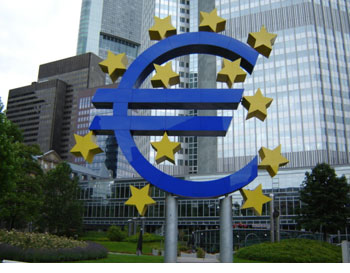 The 16 eurozone countries cracked under German pressure on Thursday and called in the International Monetary Fund [IMF] to help rescue Greece.
The 16 eurozone countries cracked under German pressure on Thursday and called in the International Monetary Fund [IMF] to help rescue Greece.
Under the plan, which comes with strict conditions and makes no money available right now, the safety net would total up to 22 billion euros (almost half of the total Greece needs this year to keep its economy afloat). It would apply only if market lending to Greece dried up.
The following is the text of a draft euro zone agreement on aid for the debt-ridden Mediterranean country.
From Reuters:
[emphasis added]“We reaffirm that all euro area members must conduct sound national policies in line with the agreed rules and should be aware of their shared responsibilities for the economic and financial stability in the area.
We fully support the efforts of the Greek government and welcome the additional measures announced on 3 March which are sufficient to safeguard the 2010 budgetary targets. We recognise that the Greek authorities have taken ambitious and decisive action which should allow Greece to regain the full confidence of the markets.
The consolidation measures taken by Greece are an important contribution to enhancing fiscal sustainability and market confidence. The Greek government has not requested any financial support. Consequently, today no decision has been taken to activate the below mentioned mechanism.
In this context, euro area member states reaffirm their willingness to take determined and coordinated action, if needed, to safeguard financial stability in the euro area as a whole, as decided on the 11th of February.
As part of a package involving substantial International Monetary Fund financing and a majority of European financing, euro area member states are ready to contribute to coordinated bilateral loans.
This mechanism, complementing International Monetary Fund financing, has to be considered ultima ratio, meaning in particular that market financing is insufficient. Any disbursement on the bilateral loans would be decided by the euro area member states by unanimity subject to strong conditionality and based on an assessment by the European Commission and the European Central Bank. We expect euro member states to participate on the basis of their respective ECB capital key.
The objective of this mechanism will not be to provide financing at average euro area interest rates, but to set incentives to return to market financing as soon as possible by risk adequate pricing. Interest rates will be non-concessional, i.e. not contain any subsidy element. Decisions under this mechanism will be taken in full consistency with the treaty framework and national laws.
We reaffirm our commitment to implement policies aimed at restoring strong, sustainable and stable growth in order to foster job creation and social cohesion.
Furthermore, we commit to promote a strong coordination of economic policies in Europe. We consider that the European Council should become the economic government of the European Union and we propose to increase its role in economic surveillance and the definition of the European Union growth strategy.
The current situation demonstrates the need to strengthen and complement the existing framework to ensure fiscal sustainability in the euro zone and enhance its capacity to act in times of crises.
For the future, surveillance of economic and budgetary risks and the instruments for their prevention, including the excessive deficit procedure, must be strengthened. Moreover, we need a robust framework for crisis resolution respecting the principle of member states’ own budgetary responsibility.
We ask the president of the European Council to establish a task force with representatives of member states, the Commission and the ECB, to present, before the end of this year, the measures needed to reach this aim, exploring all options to reinforce the legal framework.”
No figures were mentioned in today’s accord, but French President Nicholas Sarkozy said the Eurozone would put up two-thirds of the money, and the IMF the rest. “We didn’t count up to the last euro,” he said. “It can be adjusted.”
“Europe has taken a big step in the face of a big challenge,” Greek Prime Minister George Papandreou told reporters after talks in Brussels, declaring himself satisfied.
- Bulenox: Get 45% to 91% OFF ... Use Discount Code: UNO
- Risk Our Money Not Yours | Get 50% to 90% OFF ... Use Discount Code: MMBVBKSM
Disclaimer: This page contains affiliate links. If you choose to make a purchase after clicking a link, we may receive a commission at no additional cost to you. Thank you for your support!

Leave a Reply